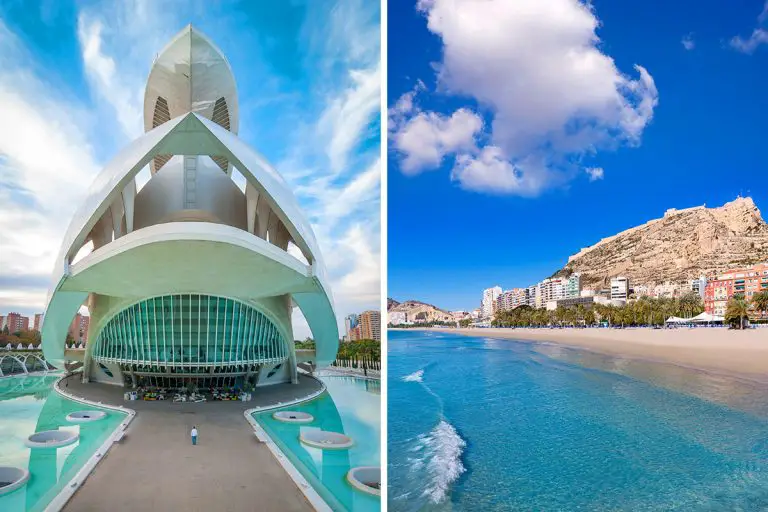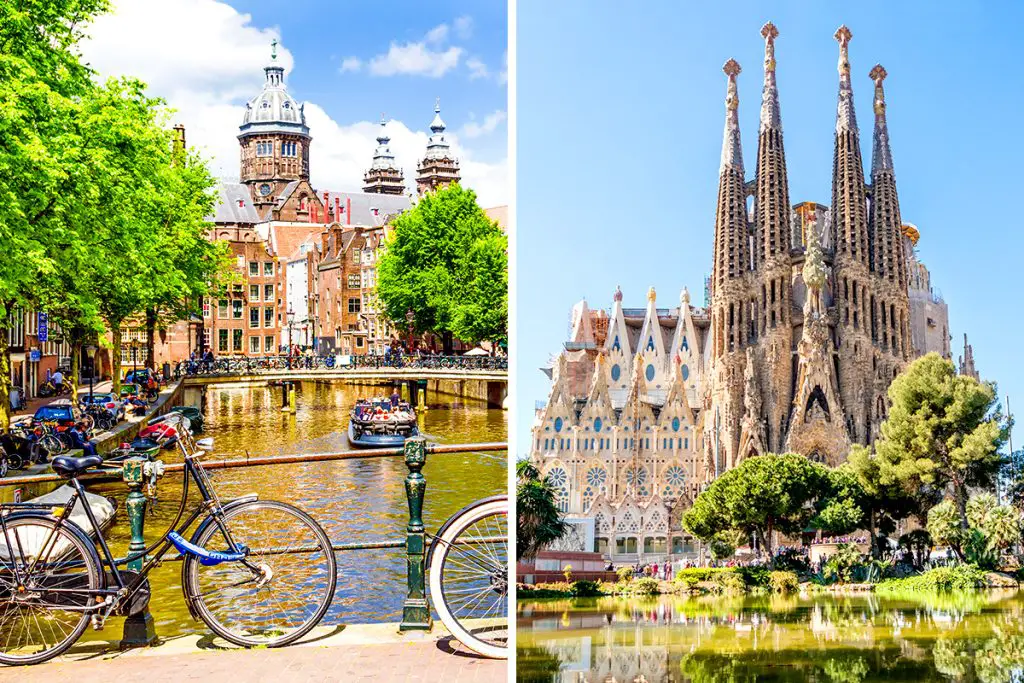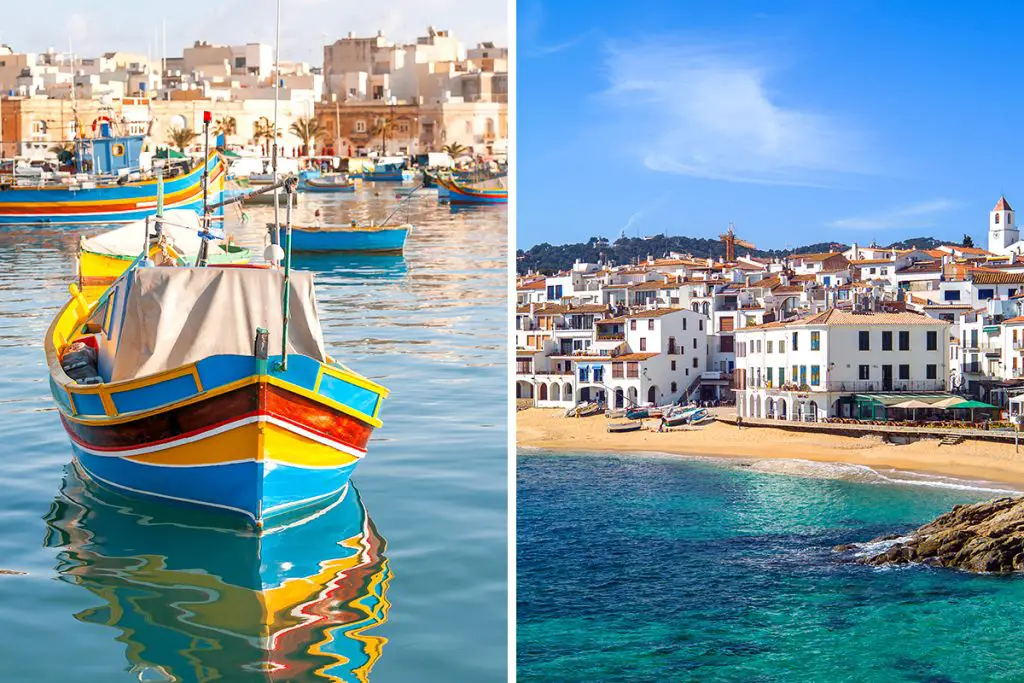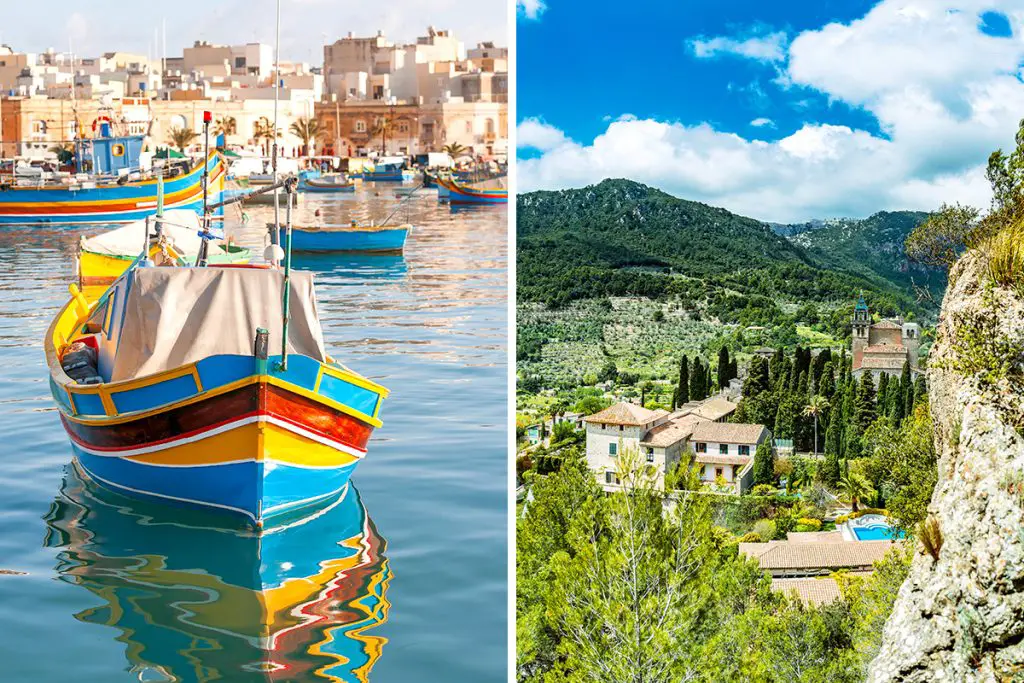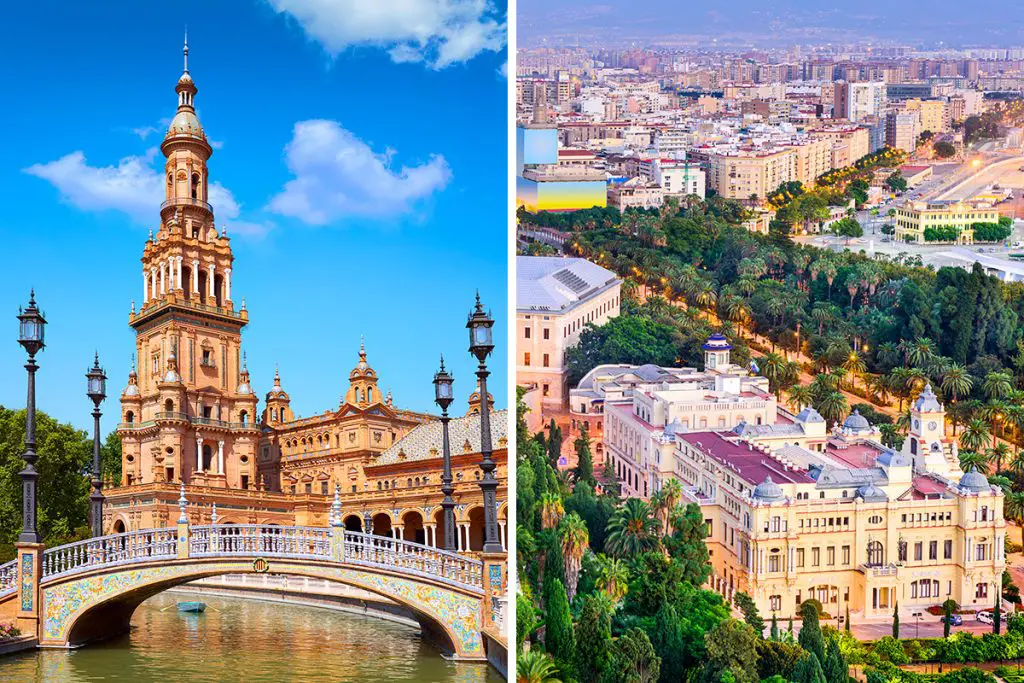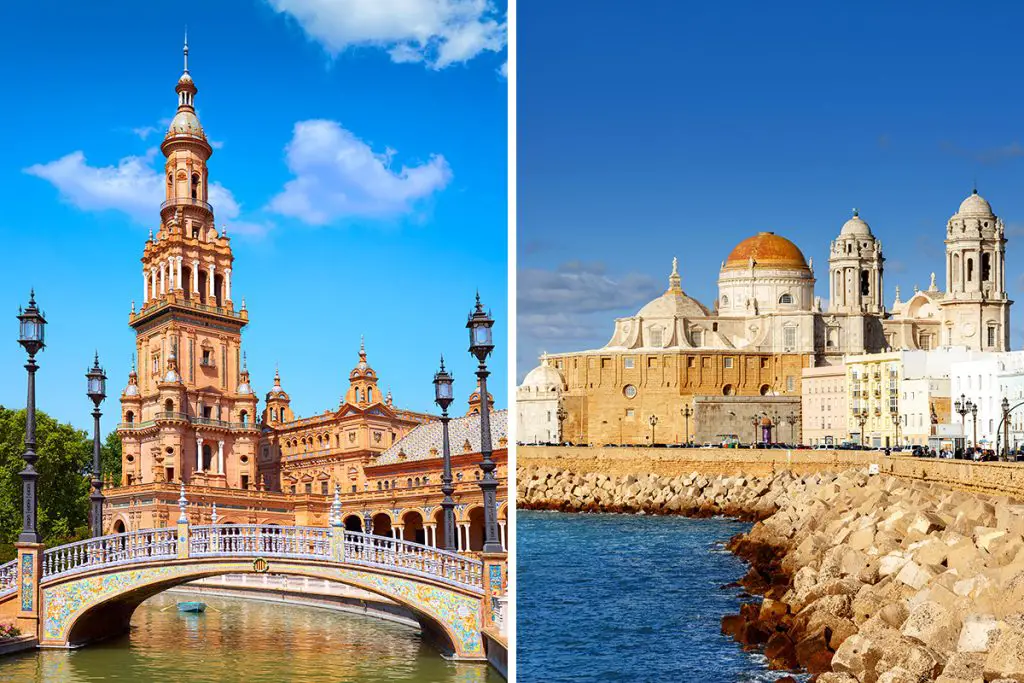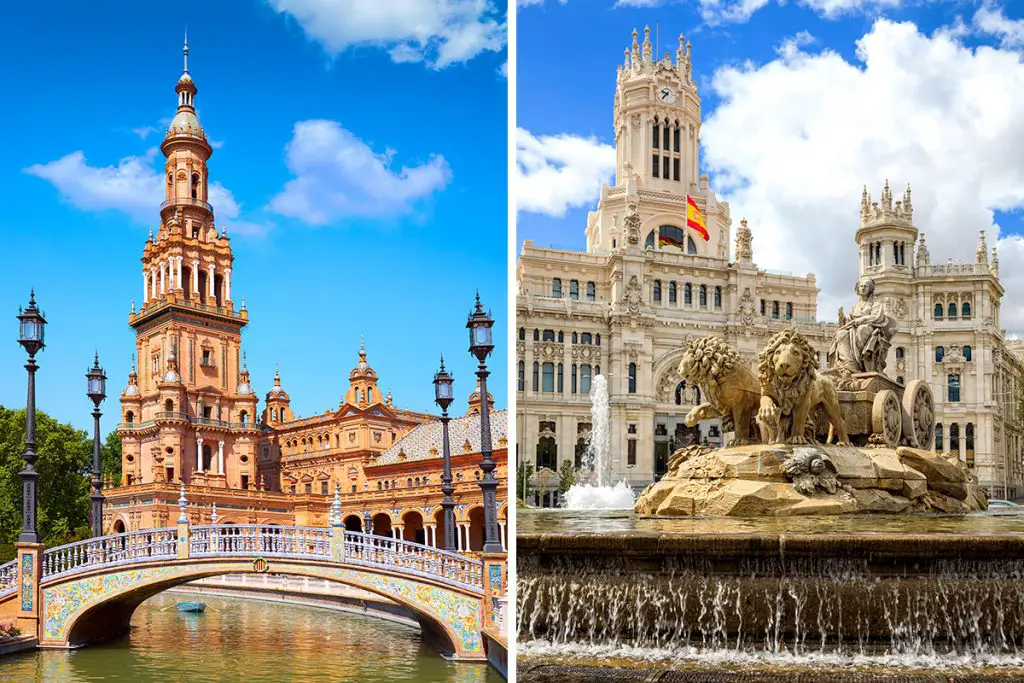Sure, both cities are fantastic gateways to the Spanish lifestyle, but they’re each unique in their own way. Valencia, the birthplace of paella, is a magnet for art lovers and science enthusiasts. Alicante boasts a serene coastline and a vibrant nightlife that could keep you entertained for days on end. So, how do you make up your mind? Keep reading to explore what sets each city apart.
History & Culture
First things first, let’s dig into the history and culture of these two Spanish gems. Knowing the past of a place can make your visit way more interesting. It’s like reading the first chapters of a thrilling book. You get the setup that makes the rest of the story even better.
Valencia has a long history dating back to Roman times, and it has been ruled by various empires, including the Moors. As a result, you’ll find a fusion of cultures that’s hard to resist. Its historic sites tell tales of battles, art, and invention.
Even the language spoken here, Valencian, is a blend of influences. Valencia is also a hotspot for modern art and scientific achievements, which shows it’s not stuck in the past.
Alicante, too, has been a melting pot of cultures. It was founded by the Romans but later occupied by the Moors, much like Valencia.
While Valencia leans more toward contemporary art, Alicante celebrates its past with grand festivals like Las Hogueras de San Juan. Imagine giant wooden statues set on fire! This place loves to mix the old with the new in a way that’s festive and alive.
But what sets them apart? Valencia is a bigger city and offers a more cosmopolitan feel. It’s like a bustling marketplace where different eras and influences meet. Alicante is smaller and gives you a more laid-back, close-knit community vibe. It’s like a cozy bookshop where you find classics and new releases side by side.
To sum up, both cities offer a rich mix of history and culture, but in their own unique ways. Valencia is a canvas of modernity blended with tradition, while Alicante offers a more intimate, festival-like atmosphere. Your choice between the two will depend on what kind of experience you’re after. So, which one tugs at your curiosity more?
Attractions & Activities
So, you’re itching to explore and have fun, huh? Let’s talk about the attractions and activities that Valencia and Alicante have to offer. These are places and experiences that can make your trip truly unforgettable.
Valencia is home to the jaw-dropping City of Arts and Sciences. This futuristic complex has an opera house, a planetarium, and even an interactive museum. It’s like stepping into a sci-fi movie!
If you’re a nature lover, don’t miss the Albufera Natural Park, where you can take a peaceful boat ride through wetlands. For history buffs, the Valencia Cathedral is a must-visit. It’s like a history book you can walk through!
Alicante isn’t one to be left behind. The Santa Barbara Castle offers panoramic views that will make your Instagram followers green with envy. If you’re into history, you can explore the ruins of this ancient fortress.
Alicante also offers the Explanada de España, a marble-laid promenade perfect for a leisurely walk. Don’t forget to visit Canelobre Caves for a different kind of adventure. Imagine exploring underground caves that look like a cathedral’s ceiling!
While Valencia is more about modernity and the future, Alicante keeps one foot firmly in the past. Valencia gives you the sensation of time travel, from ancient history to a future yet unknown. Alicante, on the other hand, feels like a leisurely stroll through a historical novel with sprinkles of adventure.
To sum it up, both cities have something for everyone. Whether you’re an explorer, a history geek, or someone looking for that perfect Instagram shot, you won’t be disappointed. Valencia offers a blend of science, nature, and history, while Alicante delights with its scenic views and historical marvels.
Beaches
Let’s face it, a trip to Spain wouldn’t be complete without soaking up some sun on the beach. But how do Valencia and Alicante stack up when it comes to sandy shores?
Valencia offers the Malvarrosa Beach, which is approximately 1.9 miles (about 3 kilometers) long. The sands are golden, and there’s ample space to lay down your towel. It’s great for a quick dip or a long day in the sun. The water depth gradually increases, so it’s safer for less confident swimmers.
Alicante, meanwhile, boasts the Postiguet Beach. It’s shorter, stretching about 0.6 miles (around 1 kilometer). But what it lacks in length, it makes up for in ambiance. Palm trees are scattered along the beach, giving it a tropical feel. The water here is also quite shallow, so it’s family-friendly too.
The key difference is in the size and vibe. Valencia’s beach is long and offers more room, making it feel less crowded. It’s like having a big playground for yourself. Alicante’s beach is cozier and more intimate. It feels like your own little paradise but can get a bit packed during peak season.
Wrapping it up, both Valencia and Alicante have fantastic beaches. Valencia’s Malvarrosa is expansive, giving you a sense of freedom, while Alicante’s Postiguet offers a more intimate, tropical atmosphere. Your choice will depend on whether you prefer a beach that’s bustling or one that’s a bit more secluded. So, which sandy shore calls to you?
Eating, Drinking & Nightlife
Hungry for more than just sights and sounds? Let’s talk about the food, drinks, and nightlife in Valencia and Alicante. Whether you’re a foodie, a party animal, or just someone looking to unwind, these cities have you covered.
When it comes to eating, Valencia is the birthplace of paella. Imagine a giant pan filled with rice, veggies, and all sorts of yummy stuff like chicken or seafood. You’ll find restaurants specializing in this local dish around almost every corner. But Valencia’s food scene doesn’t stop there; you can dig into mouthwatering tapas, fresh seafood, and other Valencian specialties.
Over in Alicante, the culinary focus is on seafood and rice dishes. Try the “arroz a banda,” a flavorful rice dish cooked in fish broth. Alicante is also famous for its tasty tapas bars where you can sample small bites like “gambas al ajillo” (garlic shrimp) and “patatas bravas” (spicy potatoes).
What about drinks? Valencia is known for its refreshing “Horchata,” a milky drink made from tiger nuts. In Alicante, you can enjoy the local wine, particularly the red Monastrell. Each city offers its own special sips that mirror their unique cultures.
Nightlife, you ask? Valencia offers a range of options, from laid-back bars to pumping clubs in areas like El Carmen and Ruzafa. Alicante has a vibrant nightlife too, especially around the marina and the historic quarter. Dance, listen to live music, or just enjoy the atmosphere.
To summarize, both cities offer delectable eating options, local drinks, and diverse nightlife experiences. Valencia offers a wider range of culinary choices and is famous for its paella, while Alicante shines with its seafood and rice dishes. Both cities offer vibrant nightlife but with their own distinct flair.
Shopping
Ready to shop till you drop? Let’s see what Valencia and Alicante have in store for you when it comes to retail therapy. Whether you’re hunting for souvenirs, designer labels, or just looking to splurge, both cities have something for you.
Valencia offers a shopping haven like the Colón Market, where you can find local crafts, gourmet foods, and small boutiques selling unique items. For designer brands, head to the shopping district around Calle Colón and Calle Jorge Juan. If you’re into vintage and retro, Ruzafa is the neighborhood to explore.
In Alicante, you can explore Mercado Central, where you’ll find local produce and artisanal products. For high-end shopping, you’ll want to visit Avenida Maisonnave. And if you’re looking for unique items, take a stroll through the historic quarter where you’ll find numerous little boutiques.
In Valencia, the shopping scene is more spread out, offering a mix of local and international options. Alicante’s shopping spots are more centralized, making it easier to navigate, especially for a quick shopping spree.
To sum it up, Valencia offers a more varied shopping experience, from high-end designers to quirky boutiques, while Alicante gives you a concentrated dose of both local and international brands. No matter your shopping style, both cities have plenty to offer. So, where would you like to unleash your inner shopaholic?
Accommodation
So, you’re looking for a cozy bed after a day of exploring? Let’s look at the accommodation scene in both Valencia and Alicante. Where you lay your head can make or break your trip, so listen up.
In Valencia, you’ll find a wide variety of lodging options. From luxury hotels like The Westin Valencia to charming bed-and-breakfast spots in the historic El Carmen district, the city caters to all budgets and styles. Many accommodations also offer rooftop terraces with city views, perfect for winding down.
Alicante has a slightly more laid-back approach to accommodation. You’ll find a number of sea-view hotels, especially around the marina and Postiguet Beach. Budget-friendly hostels and guesthouses are also available in the city center, offering a homey feel.
One thing to note is that Valencia generally has a larger selection, given its size and the diverse crowd it attracts. Alicante, on the other hand, provides a more intimate lodging experience with its seafront hotels and cozy inns.
In summary, Valencia offers a wider range of options, suited for both luxury and budget travelers. Alicante leans more towards intimate, sea-view hotels and cozy, budget-friendly spots. Both cities offer something unique, so choose based on your own comfort and style.
Family-Friendliness & Children’s Activities
Got the whole family with you? No worries, let’s delve into how Valencia and Alicante cater to younger travelers and families. Both cities have their unique perks for kids and parents alike.
Valencia offers the Bioparc, an immersive zoo experience that kids absolutely love. There’s also the Gulliver Park, a massive playground shaped like the character Gulliver from the famous tale. It’s a giant fun zone where kids can climb and explore.
Alicante offers the Alicante Miniature Railroad Club, a hit among kids who love trains. The city also has various parks, like El Palmeral, with ponds, waterfalls, and play areas that are sure to keep the little ones engaged.
Both cities have plenty of open spaces and parks where kids can run freely. Valencia offers more structured activities and educational spots, while Alicante focuses on natural settings and outdoor play areas.
In a nutshell, both Valencia and Alicante offer a variety of kid-friendly activities. Valencia has a bit more of an educational twist, while Alicante lets kids be kids with its outdoor parks and play areas. Either city is a win-win if you’re traveling with family.
Getting There & Getting Around
You’re all set to go, but how do you actually get to these cities and move around once you’re there? Let’s unpack the nitty-gritty of transportation in Valencia and Alicante.
Valencia is easily accessible by plane, with its international airport located just 5.6 miles (about 9 kilometers) from the city center. Alicante’s airport is roughly 6.8 miles (about 11 kilometers) from the city. Both airports are well-connected with major European cities.
Once you’re in Valencia, the city has an efficient metro system that covers most tourist spots. Buses and taxis are also widely available. In Alicante, the tram is your go-to mode of transport, especially for getting to the beach. Buses and taxis are also plentiful.
In terms of getting around, Valencia’s larger size means you might rely more on public transport. Alicante’s more compact layout makes it easier to explore on foot or by tram.
To sum it up, both cities are easily accessible by air and offer a range of local transport options. Valencia has a more extensive metro system suitable for longer distances within the city, while Alicante’s tram and smaller size make getting around a breeze. Choose your destination based on your mobility preferences.
Weather
When you’re planning a trip, weather is a big deal. After all, no one wants a vacation spoiled by unexpected rain or scorching heat. So, how do Valencia and Alicante stack up in terms of climate? Let’s dig in.
Valencia tends to have hot summers, especially in July and August, where temperatures can soar up to 95°F (35°C). Winters are mild, and you can expect temps between 45-60°F (7-15°C) from December to February.
Alicante is quite similar but a tad warmer. Summers peak at about 100°F (38°C), especially in July. Winters are gentle with temperatures rarely dipping below 50°F (10°C), even in the coldest months like January.
Both cities enjoy plenty of sunshine year-round, but Valencia can be a bit more humid. Alicante’s coastal location offers a more breezy, Mediterranean climate that many find refreshing.
In summary, if you prefer slightly cooler summers, Valencia may be your go-to. But if you love basking in the warmth, Alicante’s higher temps could be a plus. Either way, both cities promise sunny days and mild winters.
Safety
Nobody wants to stress about safety when on vacation. How do Valencia and Alicante measure up on this front? Let’s find out.
Valencia is generally a safe city with low crime rates. However, like any urban area, it’s good to stay alert in crowded places where pickpocketing could occur. Alicante also enjoys a reputation for being safe, but the same caveats apply: watch your belongings and be cautious in busy areas.
Non-crime safety topics, such as road conditions, are also worth considering. Both cities have well-maintained roads, and public transportation is reliable.
Valencia is a bit larger and busier, which may mean more traffic and larger crowds. Alicante, being smaller, offers a more relaxed atmosphere which some might find adds an extra layer of comfort to their stay.
All in all, both cities are generally safe, but staying alert is good practice. Your choice might come down to whether you prefer the hustle and bustle of Valencia or the more relaxed feel of Alicante.
Cost
When planning a trip, your budget is crucial. So how do Valencia and Alicante compare in terms of costs? Let’s crunch some numbers.
Valencia offers a broad range of dining options. You can find meals for as low as €10 (approximately 12 USD) at casual dining spots. Alicante also has affordable eating options, but expect to pay a bit more, around €12-€15 (14-18 USD), for a meal at similar places.
In terms of accommodation, Valencia can be a bit pricier. A mid-range hotel could cost around 200 USD per night (about 120 USD), while in Alicante, you might find similar lodging for about 150 USD.
Public transportation is a bit cheaper in Alicante, where a single tram or bus ticket will cost you around €1.45 (roughly 1.70 USD). In Valencia, a single metro ticket starts at €1.50 (1.80 USD).
In summary, while both cities offer a range of options for different budgets, Alicante generally comes out a little cheaper, especially in terms of accommodation and transportation. Either city can be budget-friendly if you plan wisely.
Which Is Better – Valencia or Alicante?
Deciding between Valencia and Alicante can feel like a challenging task. Both cities offer a unique blend of experiences that could suit various tastes and preferences. But how do they stand up when scrutinized in every aspect? Let’s delve into a side-by-side comparison to make your decision easier.
In the realm of history and culture, Valencia tends to offer a more bustling, cosmopolitan atmosphere laden with architectural marvels and a vibrant arts scene. Alicante, although more quaint, offers its own historical charms and a tranquil cultural milieu.
If you are passionate about history and arts, Valencia is your go-to. But for those of you who prefer a quieter, more relaxed cultural exposure, Alicante has its own unique allure.
When it comes to attractions and activities, Valencia offers a more diverse range of options, including museums and parks. Alicante also has its share but on a smaller scale. If diversity of activities is crucial for you, Valencia wins, but for more niche interests, Alicante could be the place to be.
Both cities are graced with beautiful beaches, but they offer different experiences. Valencia’s beaches are larger and more spacious, while Alicante’s are smaller and often less crowded. If you’re after wide expanses of sand, Valencia is the place; if you’re after intimacy and smaller crowds, Alicante wins.
Eating, drinking, and nightlife differ between the two cities. Valencia is the hotspot for a broader range of culinary options and vibrant nightlife. Alicante, on the other hand, has a more relaxed and laid-back atmosphere, especially for evening outings. If high-energy evenings are your style, Valencia is for you; if you prefer slower-paced, scenic evenings, Alicante is your choice.
Shopping in Valencia tends to be a grander affair with large malls and diverse boutiques. Alicante provides a more concentrated and relaxed shopping experience. Those of you seeking a wide range of shopping options will find Valencia more appealing, while Alicante is perfect for leisurely, focused shopping.
As for accommodation, Valencia offers a broader range of options, from luxury to budget. Alicante, while more limited, offers its own charm with more intimate, boutique-style lodgings. Family-friendliness and children’s activities are abundant in both, but Valencia provides more options due to its larger size.
Getting to and around both cities is relatively straightforward, but Valencia has more extensive public transport. For weather, both cities enjoy a Mediterranean climate, but Valencia tends to be a bit warmer year-round. Safety is comparable in both cities, with Valencia having slightly more hustle and bustle.
In general, Valencia, being a larger and more tourist-centric city, tends to be on the pricier side for lodging, food, and activities. Alicante offers a more budget-friendly experience without compromising too much on quality. Whether it’s a casual meal out or a taxi ride across town, you can generally expect to pay a bit less in Alicante.
So, which destination should you choose? If you’re looking for a vibrant, bustling experience with an array of options to choose from, Valencia is your go-to destination. However, if you’re more inclined towards a relaxed, laid-back vacation with scenic beauties, Alicante will be more up your alley. Your individual tastes and preferences will ultimately determine the perfect destination for your next Spanish getaway.

